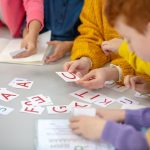Share this
Early literacy development is essential to provide your young child with a strong foundation for his or her educational journey. As a parent, supporting your child’s early literacy skills is a rewarding task, influencing their ability to read, write, and communicate effectively in the future. This blog aims to share strategies and highlight parental behaviors that can make a significant difference in fostering early literacy development in toddlers.
What is early literacy?

Early literacy refers to the foundation and development of essential reading and writing skills in children from birth to around age five. It encompasses a child’s foundational experiences with books, stories, and print materials, as well as their ability to understand and use language, communicate and listen effectively, and recognize and manipulate sounds and letters. Early literacy comprises various components, including phonological awareness (able to recognize and manipulate sounds), alphabet knowledge, print awareness (able to recognize letters and words), vocabulary development, listening and comprehension skills, and the development of oral language.
Why does literacy matter at pre-school age?

Developing early literacy skills is crucial for a child’s later success in reading and overall academic achievement. Research has shown that children who enter school with well-developed early literacy skills tend to perform better in reading and writing in school, which ultimately leads to a higher success rate in their education and beyond. Furthermore, children who struggle with reading at an early age are more likely to continue struggling throughout their schooling. These children may experience negative long-term consequences, such as lower self-esteem, challenges with social interactions, and limited job opportunities.
In addition to academic achievement, early literacy is essential for the development of critical thinking and problem-solving abilities. As children become skilled readers, they learn to analyze, synthesize, and evaluate information to form opinions, make decisions, and solve problems. This cognitive process fosters creativity, adaptability, and confidence, which are vital life skills that contribute to an individual’s personal, professional, and social development.
How do I help my toddler acquire literacy skills?
1. Simply Talking to Your Child More Often

The easiest, but perhaps the most important way that parents can help their young child acquire literacy skills is by simply talking to them. A study conducted by University of Kansas researchers found that children from high-income families were exposed to an astonishing 30 million more words than children from families receiving welfare in the first four years of life. This discrepancy resulted in differences in the child’s later academic performance. So, simply talking to your toddler more often makes a large difference in their literacy development. It doesn’t have to be anything specific. Reading picture books to them, asking them questions, talking about food, or discussing cartoon characters are just some examples of what you can do.
2. Engaging in Interactive Reading

This point is related to the point number 1 above. Reading aloud to your toddler presents an excellent opportunity to foster early literacy skills. When reading together, discuss the book’s content, point out interesting pictures, and ask open-ended questions to engage your child in the story. The key is to ask open-ended questions, not just “Yes” or “No” questions.
Another reading strategy you can try with your pre-school child is “Dialogic Reading“. It is a way of reading where the parent takes the role of a listener and questioner and the child is the active reader of the book. After reading the book to your child for the first time, try the PEER sequence and let your child be in the driver’s seat. According to Reading Rockets, the PEER sequence is:
Prompts the child to say something about the book,
Evaluates the child’s response,
Expands the child’s response by rephrasing and adding information to it, and
Repeats the prompt to make sure the child has learned from the expansion.
A few weeks of dialogic reading can have a significant impact on your child’s literacy development.
3. Building a Language-Rich Environment
Creating an environment filled with diverse language experiences sets the stage for effective language development in toddlers. Tactile, auditory, and visual engagement contribute to improved language skills in young children. Consider incorporating the following strategies to establish a language-rich environment:
- Reading aloud with your child daily
- Having rich conversations with your toddler
- Displaying word labels on common household items
- Listening to age-appropriate music and songs
- Watching educational videos and programs
4. Teaching Phonics and Phonemic Awareness
Phonics, the ability to connect sounds with corresponding letters, and phonemic awareness, awareness of individual sounds within words, are key foundational skills for literacy. Teaching phonics and phonemic awareness can begin with simple activities such as:
- Identifying and pronouncing letter sounds
- Creating blending and segmenting exercises (e.g., “cat” – “c-a-t” – “cat”)
- Practicing rhyme recognition and generation
These activities reinforce the connection between letters, sounds, and words, assisting toddlers in developing early reading and writing abilities.
5. Promoting Writing Skills

Even before learning to write letters, toddlers benefit from opportunities to develop their fine motor skills and understand the concept of written communication. Encourage your toddler to scribble, draw, and experiment with different writing materials. Provide magnetic letters or puzzles for letter recognition, and as your toddler’s ability progresses, introduce the formation of basic letters.
6. Encouraging a Love for Learning and Reading

Establishing a positive, nurturing learning environment motivates toddlers to develop a love for learning and reading. Enjoyable and relaxed reading experiences foster confident readers and fuel the development of early literacy skills. Some ways to achieve this are:
- Using a variety of books with appealing visuals, colors, and textures
- Connecting stories with real-life experiences
- Relating books to your toddler’s interests and hobbies
- Having a designated reading space stocked with age-appropriate books and writing materials
7. Celebrating Milestones and Encouraging Growth
As your child reaches important developmental milestones, offer praise and support to boost their confidence and encourage ongoing progress. Identify your toddler’s strengths and promote continued growth by offering multiple opportunities to engage in language and literacy activities.
Parental Involvement Matters
Parental involvement in children’s early learning experiences is critical for promoting strong language and literacy skills. Supporting a child’s literacy requires time, dedication, and patience. Parents should focus on creating a nurturing environment, engaging in stimulating conversations, providing access to diverse reading materials, and serving as positive role models. Research has shown that children with involved parents attain higher grades, attend school regularly, and have better social skills. When it comes to literacy development of toddlers, parental involvement has a large impact on the child.
Conclusion
In conclusion, fostering early literacy in toddlers is a rewarding task with lifelong benefits. By incorporating the strategies discussed, parents can create a rich and supportive environment that promotes the acquisition of essential language and literacy skills.
Richard Zhang, M.Ed., is an educator and a software developer with a Masters degree in education from University of Toronto and an immense passion for education and learning. Until the pandemic, Richard owned an award-winning learning centre in Toronto. For 15 years, he has taught and mentored hundreds of elementary, middle school, and high school students succeed in academics. He is also an app developer specializing in web and mobile application in educational and business sectors.






